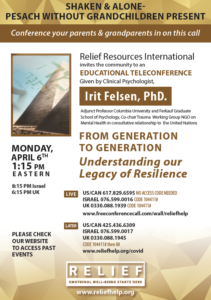On Monday, April 6th at 1:15 pm, I will be giving a teleconference presentation entitled “From Generation to Generation: Understanding Our Legacy of Resilience”, in which I will speak about the difficulties many are experiencing as they are separated from children, elderly parents and other family members and friends due to the COVID-19 pandemic. This presentation is part of a series of online lectures organized by Relief Help, to help the community in these difficult times. You will be able to listen to this presentation live by calling in to the numbers on the flyer (attached), or you can listen to this and other lectures on the website at this link.

Being apart for long duration, and not being able to see our loved ones because we have to restrict exposure to each other in order to protect others and ourselves, has been a trying challenge for many. On the Seder night and during the Passover holiday, being alone will be an even more unusual and potentially distressing experience for many.
The presentation is aimed at those of us who will not be able to be with family and friends as planned. The unprecedented circumstances that have changed our lives over the recent weeks bring up anxiety in all of us. This is an understandable and even appropriate response, which helps us deal with the threat we are all facing in ways that will hopefully result in the “flattening of the curve” of the spread of the disease.
It is important that we recognize that, for many who are children of Holocaust survivors, and even others who are not, the current quarantine and “social distancing” might trigger additional fears and anxieties related to past traumatic circumstances during the Holocaust. The fear for one’s own life and for the life of others whom we love, but cannot necessarily protect, is traumatic for anyone, but can be even more traumatic for people who have suffered the horrors of the Holocaust and their descendants, who have absorbed many of their parents’ experiences, whether these experiences were talked about in the family or not. Having been separated from loved ones, and having no ability to protect loved ones in the Holocaust, might make the current separation from family and friends more ominous, bringing up echoes of forced segregation, separation and isolation, and the fact that loved ones were often never seen again. The fear of potential future shortage of goods is a real concern, but might be even more frightening for those who suffered starvation in the past, or their children who grew up with parents whose relationship to shortage was fraught with real trauma. Also, the knowledge of the ruthlessness that can surface quickly when circumstances create real and terrible situations, the fear of the collapse of law and order, is part of the “dual reality” that the intergenerational memory of the Holocaust has created in the descendants of survivors, and more generally in the Jewish people. However, the legacy of the Holocaust has also endowed us with unique strengths and a “first hand” experience of the resilience and the adaptive coping that is possible even in extreme situations.
My presentation on Monday will focus on practical steps to enhance the way we cope with the challenges of COVID-19 in general, and in particular with the upcoming prospect of spending the Seder Night without loved ones and with fewer people around the table, or even alone.
With wishes for good health and a good Passover holiday to each and every one of you, yours warmly
Irit Felsen

Leave a Reply